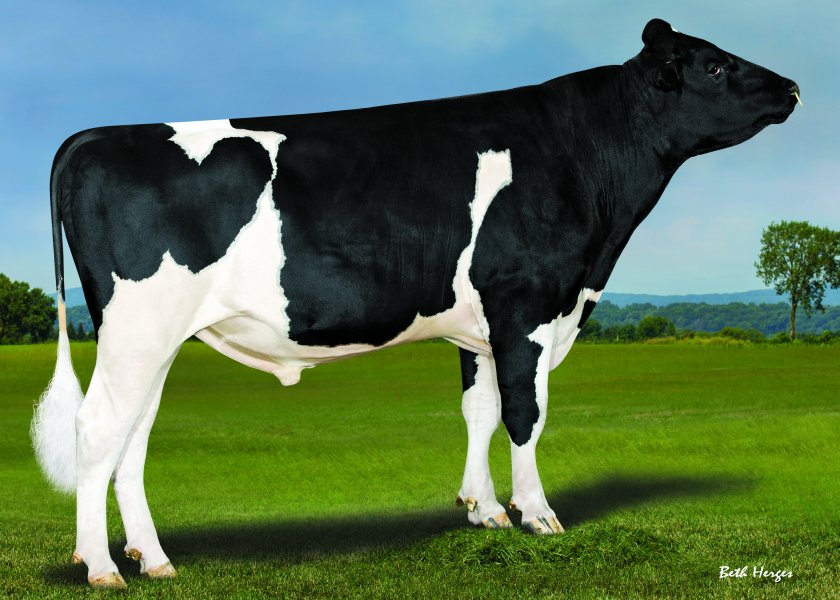
Dairy producers cranking up for autumn calving and turning their attention to genetic selection will find bulls to suit their needs in the Autumn Calving Index (£ACI) ranking.
Two of these bulls share pole position – the high fat and protein sire, Progenesis Wimbledon and newcomer, Wilra KnowHow, according to AHDB's ranking.
Wimbledon moves up one place to take this position, now with an ACI of £703. This reflects his outstanding Predicted Transmitting Abilities (PTA) for both fat and protein percent, which he combines with a high daughter Fertility Index and good Lameness Advantage.
Equal front-runner, Wilra KnowHow, who also leads the Holstein Profitable Lifetime Index ranking, is noted for his high production transmission.
Another new entrant, in third position, comes in the shape of Koepon Raptor (ACI £676). Raptor is another high milk components bull, with long daughter lifespans who also transmits shorter-than-average gestation length to the calves he sires.
The high HealthyCow Holstein bull, Pine-Tree CW Legacy, now ranks fourth (ACI £667), while Bomaz Kettle is a new entrant and high fat transmitter, who ranks fifth (ACI £653).
The former number one sire, Genosource Captain, now ranks sixth, with an £ACI of £650.
The next three places are shared on equal ACIs of £647. The first is Westcoast Guarantee, who now has 156 UK daughters contributing to his figures and stands out as a leading udder health sire.
Next up is Bomaz Complex, a high fat production sire with good calf survival and shorter gestation length. And completing this trio is all-rounder, Aardema Pistolero.
The top 10 is rounded off by Pine-Tree Legacy Cheese (ACI £638), a new graduate on to the list who has inherited many of the characteristics of his sire (Legacy).
Amongst the bulls ranked on Spring Calving Index (£SCI), formulated for its suitability for grazing-based herds calving in a tight spring block, Progenesis Wimbledon holds the lead, just as he does for £ACI.
His £SCI of £604 reflects his transmission of good milk quality and high daughter fertility, so important for this group.
In second place is new entrant, VJ Hoholt Gates Google, a Jersey bull which also transmits high fat and protein percents, and very favourable maintenance feed ratings. His SCI is £586.
Third position goes to the second Jersey in this across-breed ranking, demonstrating a similar transmitting pattern to the number two sire.
With an SCI of £581, VJ Groenbjerg Lobo Lobster has 85 UK milking daughters and transmits very high fat percentage.
Leading proven Holstein sire, Wilra Knowhow, is a new entrant in this ranking, and takes fourth position with an SCI of £578.
This bull’s extreme yields will suit block calving systems looking to inject some production, which he combines with much smaller-than-average stature for the Holstein breed.
Jersey VJ Hoeholt Jern James now has over 100 UK production daughters contributing to his SCI of £570, which earns him fifth position.
The next two Holstein sires are the new entrants, Koepon Raptor (SCI £560) and Pine-Tree Legacy Cheese (SCI £544). Raptor transmits good udder health, lifespan, and short gestations while Cheese has favourable Maintenance figures.
In eighth position is Denovo 7921 Atrium, whose 3,000+ UK milking daughters earn him an index featuring high weights of fat and protein and extreme small stature.
Pine-Tree CW Legacy ranks ninth (SCI £535), having the best daughter fertility index of the top 10 sires.
And completing the top 10 is new entrant, Bomaz Complex, transmitting the highest weight of fat of the top 10 bulls.
Marco Winters, head of animal genetics for AHDB, said: “The £ACI and £SCI rankings don’t just allow producers with block calving systems to choose the best bulls for their own situation, but they also allow comparisons across breeds.
“This means these two indexes have an important role to play in genetic selection for crossbreeding herds, as well as those simply calving in a spring or autumn block.
“However, because these are across-breed indexes, they are expressed as a comparison to the average of a mixed breed group.
"It’s important to note that their component PTAs should not be compared with PTAs for each individual breed group.”
